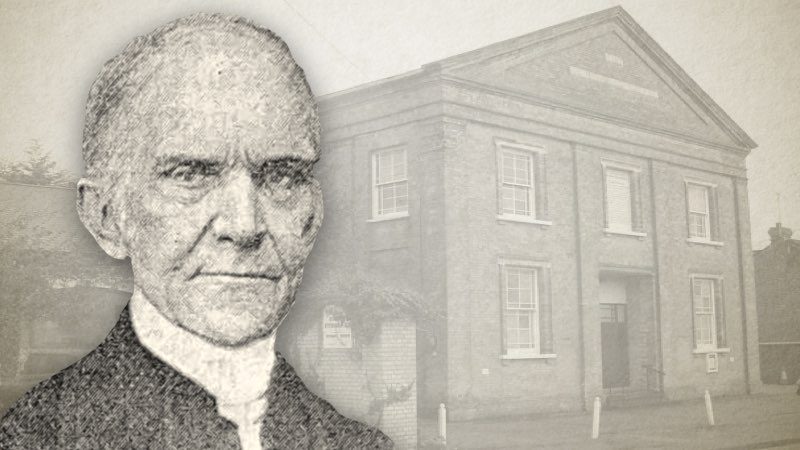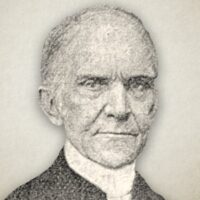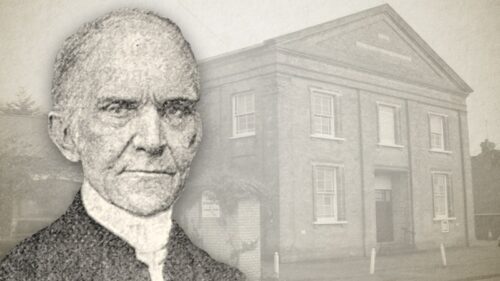
The Life And Ministry Of George Wright
Earthen Vessel 1891:
The ancient town of Beccles. the scene of the ministerial labours of the late George Wright, is pleasantly situated on the banks of the river Waveney by which it is bounded on the north and west. In this far-famed locality the Strict Baptists have long flourished; and today the cause of truth, under the pastoral care of our brother H. L. Colls, appears as united, happy, and successful as ever. To God be all the praise.
The memory of George Wright is still ardently cherished by a large number of Christian friends in Beccles and its surroundings, although many years have rolled away since his mellow voice was heard in defense of the glorious Gospel of Christ. We gather from “his own account,” published by Mr. S. K. Bland in 1874, that he was born at Framlingham, on the 19th of May, 1789, when provisions were exceeding dear, flour being 7s. per stone. In the June of 1809 he went to Southwold where he remained upwards of eighteen years and during a part of which time he worshipped amongst the Wesleyan Methodists, and was the subject of deep soul exercises. Being anxious to benefit others, he began preaching in conjunction with the Methodists on May 29, 1814. About four years afterwards his mind underwent a great change from close study of the Word of God, and the Spirit’s application of it to his soul. The portions of Scripture which convinced him of the unsoundness of the doctrines he had held were Eph. 1:3,4. He says: “The word ‘according’ connecting these verses was like a nail fastened in a sure place, and forced upon me the conviction that we are blessed with all spiritual blessings according as we were chosen in Christ before the world began. From that time the Bible seemed to me a new book. I could trace the precious truth of God’s electing love in all its pages; and so clearly and irresistibly was this doctrine presented to my mind that I was compelled to receive it with my whole heart.”
Eventually Mr. Wright was led to see the Scriptural ordinance of believers’ baptism, and was accordingly immersed March 17th, 1822. In the following April he received an invitation to preach at Beccles, and in the May of 1823 he was unanimously chosen to the pastorate, but did not finally remove to the town till Oct. 11th, 1827. His services were much sought after by surrounding Churches, but he continued the faithful and successful pastor of the Church at Beccles for the long period of forty-eight years. He sweetly fell asleep in Jesus, Oct. 7th, 1873.
The history of the Strict Baptist cause at Beccles, as given in Mr. Bland’s excellent “Memorials of Geo. Wright” is very interesting—viz.: “In the early part of last century a small Baptist Church was formed in this town and connected with a Church of the same faith in Rushall, Norfolk, under one pastorate. It has been said that Dr. Gill took part in an ordination service by giving a charge to the pastor, and that the charge in manuscript is still somewhere extant. Probably the pastor was Mr. Simmons, who died about the year 1759. The celebrated Mr Robert Robinson, then a young man, preaching in Norwich, was invited to supply the vacancy occasioned by the death of Mr. Simmons; but on the recommendation of Mrs. Anne Dutton of Great Gransden, Hunts, a woman whose name is fragrant to many of the saints of God for her eminently spiritual letters and writings, Mr. Robinson was requested by the Baptist Church in St. Andrew’s-street, Cambridge, to preach the word of salvation to them, and eventually he was settled in the pastorate of that Church. Not many years after, the Church in Beccles was dissolved.
“An interval of about thirty years elapsed, when a few brethren in Beccles, who had obtained mercy, attended the ministry of that faithful servant of Christ, the late Mr. Job Hupton, of Claxton, Norfolk, and were baptized by him on a profession of their faith. Claxton being ten miles from Beccles, the journey thither on the Lord’a-day was attended with much inconvenience, and in the year 1805 these brethren considered it their duty, though with very insufficient means, to build a house for worship in their own town, that others might enjoy with them the word and ordinances of Christ. At a subsequent period galleries were erected, and from time to time various alterations were effected for the purpose of affording sufficient accommodation to an increasing congregation.”
From plans prepared by Mr. S. K. Bland, a new chapel was erected in 1860, on a piece of ground presented to the friends by Sir Morton Pete. Near the site of the chapel three faithful men were burnt at the stake in the reign of Queen Mary, and in honor of their loyalty to Christ and His truth the friends named the chapel, “The Martyrs’ Memorial.” During the latter part of Mr. Wright’s time, Mr. S. K. Bland ministered to the friends with much acceptance, and after an interval of several years Mr. L. H. Colls was chosen pastor, in which sacred office he has been upheld and greatly blessed to the present day. To God be all the glory. Amen.—Ed.
George Wright (1789-1873) was a Strict and Particular Baptist preacher. In 1823, he was appointed pastor of the church meeting in Beccles, Suffolk. The chapel in which they eventually met was called The Martyrs’ Memorial on account of its locality to the site where three men were executed for their faith under the reign of Queen Mary.




